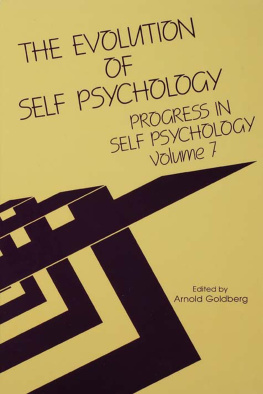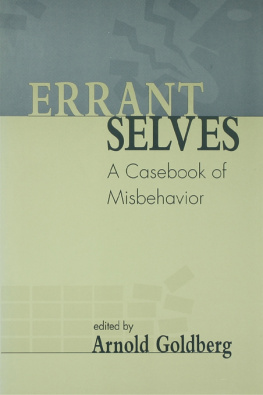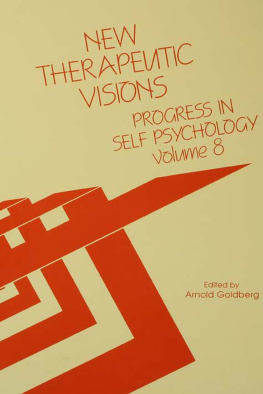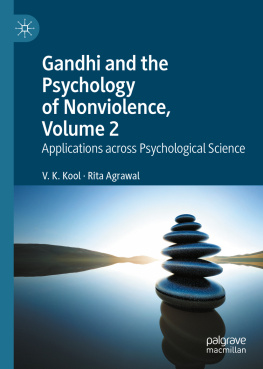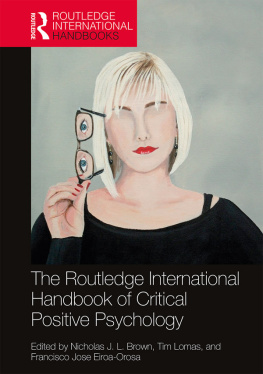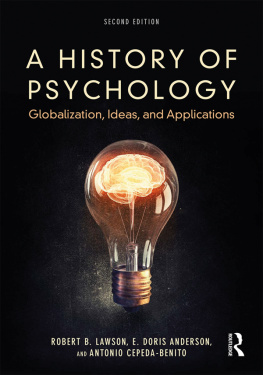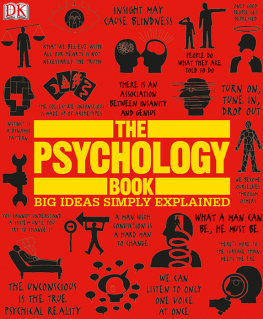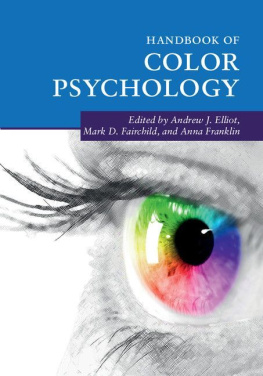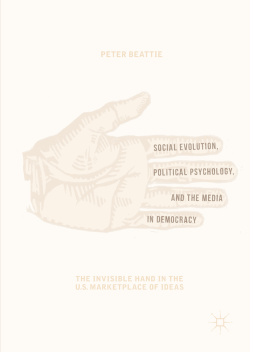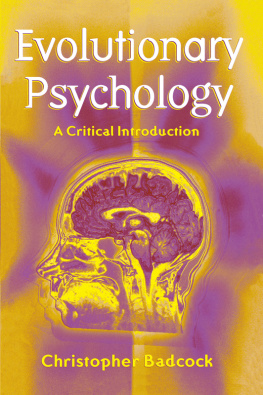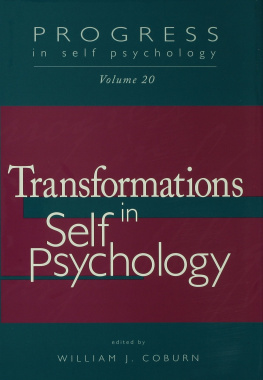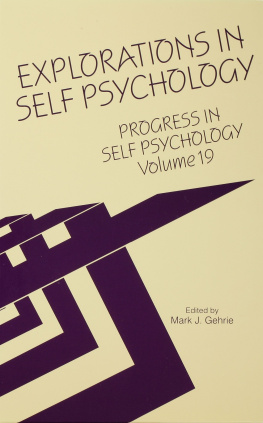THE EVOLUTION OF
SELF PSYCHOLOGY
Progress in Self Psychology
Volume 7
Progress in Self Psychology
Editor, Arnold Goldberg, M.D.
EDITORIAL BOARD
Michael F. Basch, M.D.
James L. Fosshage, Ph.D.
Robert J. Leider, M.D.
Herbert Linden, M.D.
Arthur Malin, M.D.
Anna Ornstein, M.D.
Paul Ornstein, M.D.
Estelle Shane, Ph.D.
Morton Shane, M.D.
Robert D. Stolorow, Ph.D.
Paul H. Tolpin, M.D.
Ernest S. Wolf, M.D.
THE EVOLUTION OF
SELF PSYCHOLOGY
Progress in Self Psychology
Volume 7
Arnold Goldberg
editor

Copyright 1991 by The Analytic Press
365 Broadway
Hillsdale, NJ 07642
All rights reserved. No part of this book may be reproduced in any form, by photostat, microform, retrieval system, or any other means, without prior written permission of the publisher.
ISBN 0-88163-130-2
ISSN 0893-5483
Printed in the United States of America
10 9 8 7 6 5 4 3 2 1
The preparation of this book was financed in part by funds from the Harry and Hazel Cohen Research Fund. Ms. Chris Susman provided secretarial and editorial assistance.
IV EXHIBITIONISM IN GROUP PSYCHOTHERAPY
Howard A. Bacal, M.D., Training and Supervising Analyst, Toronto Institute of Psychoanalysis; Coauthor (with K.M. Newman), Theories of Object Relations: Bridges to Self Psychology (1990, Columbia University Press).
Michael F. Basch, M.D., Professor of Psychiatry, Rush Medical College; Training Analyst, Institute for Psychoanalysis, Chicago.
Bernard Brandchaft, M.D., Training and Supervising Analyst, Los Angeles Psychoanalytic Institute; coauthor (with R. Stolorow and G. E. Atwood) of Psychoanalytic Treatment: An Intersubjective Approach (1987, The Analytic Press).
James L. Fosshage, Ph.D., Core Faculty, Institute for the Psychoanalytic Study of Subjectivity; Faculty Member and Supervisor, Postdoctoral Program in Psychoanalysis, New York University.
Robert Galatzer-Levy, M.D., Faculty, Institute for Psychoanalysis, Chicago; Lecturer in Psychiatry, University of Chicago.
Raanan Kulka, M.A., Training and Supervising Analyst, Israel Institute of Psychoanalysis; Clinical Director, Milgo-Institute of Psychoanalytic Psychotherapy for Children and Adolescents, Jerusalem.
Frank M. Lachmann, Ph.D., Core-faculty, Institute for the Psychoanalytic Study of Subjectivity, New York City; Training Analyst, Senior Supervisor, Postgraduate Center for Mental Health, New York City.
Jule P. Miller, Jr., M.D., Training and Supervising Analyst and Past Director, St. Louis Psychoanalytic Institute.
Hyman L. Muslin, M.D., Professor of Psychiatry, University of Illinois College of Medicine, Chicago.
Anna Ornstein, M.D., Professor of Child Psychiatry, University of Cincinnati College of Medicine; private practice of psychoanalysis.
Paul H. Ornstein, M.D., Professor of Psychiatry, University of Cincinnati College of Medicine; Co-Director, International Center for the Study of Psychoanalytic Self Psychology, Department of Psychiatry.
Karen Peoples, Ph.D., Associate Professor and Clinical Supervisor, Doctoral Psychology Department, California Institute of Integral Studies; private practice, clinical psychology, San Francisco, CA.
Estelle Shane, Ph.D., Founding President, Center for Early Education and College of Developmental Studies, Los Angeles; Assistant Clinical Professor, Department of Psychiatry, UCLA.
Morton Shane, M.D., Director of Education, Training and Supervising Analyst in Adult and Child, Los Angeles Psychoanalytic Society and Institute; Associate Clinical Professor, Department of Psychiatry, UCLA.
Peter Thomson, M.D., Assistant Professor of Psychiatry, University of Toronto; Training and Supervising Analyst, Toronto Institute for Psychoanalysis.
Paul Tolpin, M.D., Senior Attending, Michael Reese Hospital, Chicago; Training and Supervising Analyst, Institute for Psychoanalysis, Chicago.
Rachel Wahba, L.C.S.W., Clinical Supervisor, Operation Concern, Pacific Presbyterian Medical Center, San Francisco; private practice.
Deborah Weinstein, M.A., M.F.C.C., Clinical Faculty, Langley Porter Neuropsychiatric Institute, San Francisco; private practice.
Ernest S. Wolf, M.D., Faculty, Training and Supervising Analyst, Institute for Psychoanalysis, Chicago; Assistant Professor of Psychiatry, Northwestern University Medical School, Chicago.
Introduction:
Self Psychology Searches for Its Self Robert M. Galatzer-Levy |
Self psychology is no longer a unity. Like other revolutions in thought, self psychologys essence was at first embodied in the person of its creator. For long periods, metaphysics remained Aristotelian, physics Newtonian, Communism Marxist, evolution Darwinian, and psychoanalysis, Freudian. In other fields, no matter how well based the deviation or consistent with the founders teaching, deviation from the received image of the masters theory meant leaving the discipline. This does not seem to be self psychologys fate, at least up to the present. As this volume illustrates, Kohuts death did not halt the development of self psychology. Instead, self psychologists have created diverse points of view that amplify, extend, and correct Kohuts work.
Some of the reasons for this rapid evolution are apparent. First, Kohuts ideas were not thoroughly worked through and were clearly changing when he died, so they entreat further development rather than dogmatic adherence. Second, as Wolf demonstrates, Kohuts thinking is part of a new, increasingly egalitarian world view in which received truth can never play the central role. Third, Kohut and many of those he attracted to himself were iconoclasts whose creativity involved the reaction against venerated points of view; orthodoxy would never satisfy them. Finally, self psychologys contribution to understanding idealization means that many self psychologists have thought about and, to varying extents, worked through the meaning of idealization of a leader, and so these self psychologists are more likely to have freed themselves of the limiting effects of this idealization.
As welcome as the free spirit of self psychology is, this same free spirit leaves us perplexed about the nature of the field. Each of the authors represented in this volume in some sense addresses the question of the essence of self psychology. What are the implicit theories of knowledge that inform self psychology? What are the data of the field? What are selfobject and objects and how are they related? How do formulations from other psychoanalytic perspectives relate to those of self psychology? To what clinical and extra-clinical situations is self psychology applicable? What is the self that preoccupies us so?
WHAT ARE THE IMPLICIT THEORIES OF KNOWLEDGE THAT INFORM SELF PSYCHOLOGY?
Kohuts interest in epistemology was limited to ensuring that the empathic point of view on observation not be labeled unscientific. His remarks on the topic (e.g., Kohut, 1977), were confined to observations that respectable scientists, such as physicists, have discarded the epistemological views of the 19th century, so that psychoanalysts need not feel bound to these archaic views. Analysts, like Schafer (1970, 1975) and Klein (1976), presented thorough critiques of mechanistic views of the mind, but these mechanistic formulations continued to play an important role in Kohuts thinking, all be it in some new forms, like the bipolar self. Although Goldberg (1988) and Stolorow, Brandchaft, and Atwood (1987) presented sophisticated visions of the nature of knowledge, especially knowledge about human psychology, the main impact of these views generates questions of the admissability of various kinds of data to the discourse of self psychology. Self psychology largely continues in a mode of naive realism about entities like self, selfobject, and mind despite careful commentary that suggests more sophisticated positions.

